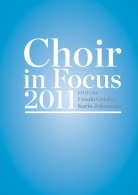
Choir in Focus 2011
Artikelnummer
592F
Kategori
Musikteori
165 kr
Att sjunga i kör är närmast att betrakta som en folkrörelse. Sverige är känt för sina många och goda körer. Men körsjungandet är stort i de flesta länder. Forskningen kring körsång och körliv har dock inte varit så högt prioriterat. På initiativ av två svenska körforskare startades därför 2009 ett internationellt nätverk, ”Choir in Focus”, som samlar forskare från olika länder i Europa.
Förra året kom den första rapporten, Choir in Focus 2010, med bidrag av 15 internationella forskare. Nu är det dags för nästa textsamling. Choir in Focus 2011 innehåller ett dussintal texter som speglar den forskning som rör körlivets och körsjungandets olika aspekter. Några av bidragen härstammar från ett körforskningssymposium som ägde rum i Lund i oktober 2010.
Språken är engelska och tyska.
The international research network Choir in Focus was initiated in 2009 by Dr. Ursula Geisler and Dr. Karin Johansson at Körcentrum Syd, Sweden. The network held its second meeting during Lund International Choral Festival in October 2010. The seminars included presentations relating to choir and identity, gender, choral leadership as well as intra-musical and artistic questions.
One aspect of the network’s activity is to explore possibilities for connections between historical and contemporary perspectives, and between research and choral performance practice. For example, a central research interest from the perspective of higher music education and musical practitioners is to increase the knowledge about what goes on during music making: What do choir leaders and choristers experience and how do they interact? Another important area is the study of leadership role models and gender issues in a historical perspective, which points to continuities and discontinuities over time in different national choir discourses.
This publication documents 11 network members’ works in progress and illustrates how choir singing and choral life may be approached from differing disciplinary origins. Choir in Focus 2011 aims at contributing to a transnational choral debate and to encourage further research on choral topics.
English and German text.
Contents:
Karin Johansson: Inside Views on Contemporary Swedish Choral Practice
Anne Haugland Balsnes: Songs of Søgne – Aspects of Place, Identity and Belonging
Colin Durrant: Engineering, Settling Baritones and Sexuality: the Togetherness of Choral Singing
Sverker Zadig: The Single Voice in the Choral Voice. How Does the Role of Informal Leaders in the Choral Voices Affect the Other Singers?
Pia Bygdéus: Artistic Leadership. The Design of a Study for Making Visible Mediating Tools for Choir Directors
Martin Ashley: The Canaries in the Cage: Lessons in the Role of Leadership and Pedagogy in Conducting from the Widening Young Male Participation in Chorus Project
Ursula Geisler: Choir Singing and Socio-Musical Attitudes. Continuity and Change in a Swedish-German Long-Term Perspective
Martin Loeser: The Beginnings of Mixed Choral Singing in early 19th Century Germany – A Brief Comparison with Sweden
Guillaume Lurton: The Social Properties of Amateur Choir Singing in France
Friedhelm Brusniak: Musikalischer Gemeinschaftsgedanke und chorsoziologische Reflexionen auf dem I. Kongress für Chorgesangwesen in Essen 1928 und der VIII. Reichsschulmusikwoche in Hannover 1929
Helmke Jan Keden: “Das neue Volkslied auf Grund der heutigen Melodie” – Anmerkungen zum Repertoirekanon des deutschen Männergesangs in der Weimarer Republik
Förra året kom den första rapporten, Choir in Focus 2010, med bidrag av 15 internationella forskare. Nu är det dags för nästa textsamling. Choir in Focus 2011 innehåller ett dussintal texter som speglar den forskning som rör körlivets och körsjungandets olika aspekter. Några av bidragen härstammar från ett körforskningssymposium som ägde rum i Lund i oktober 2010.
Språken är engelska och tyska.
The international research network Choir in Focus was initiated in 2009 by Dr. Ursula Geisler and Dr. Karin Johansson at Körcentrum Syd, Sweden. The network held its second meeting during Lund International Choral Festival in October 2010. The seminars included presentations relating to choir and identity, gender, choral leadership as well as intra-musical and artistic questions.
One aspect of the network’s activity is to explore possibilities for connections between historical and contemporary perspectives, and between research and choral performance practice. For example, a central research interest from the perspective of higher music education and musical practitioners is to increase the knowledge about what goes on during music making: What do choir leaders and choristers experience and how do they interact? Another important area is the study of leadership role models and gender issues in a historical perspective, which points to continuities and discontinuities over time in different national choir discourses.
This publication documents 11 network members’ works in progress and illustrates how choir singing and choral life may be approached from differing disciplinary origins. Choir in Focus 2011 aims at contributing to a transnational choral debate and to encourage further research on choral topics.
English and German text.
Contents:
Karin Johansson: Inside Views on Contemporary Swedish Choral Practice
Anne Haugland Balsnes: Songs of Søgne – Aspects of Place, Identity and Belonging
Colin Durrant: Engineering, Settling Baritones and Sexuality: the Togetherness of Choral Singing
Sverker Zadig: The Single Voice in the Choral Voice. How Does the Role of Informal Leaders in the Choral Voices Affect the Other Singers?
Pia Bygdéus: Artistic Leadership. The Design of a Study for Making Visible Mediating Tools for Choir Directors
Martin Ashley: The Canaries in the Cage: Lessons in the Role of Leadership and Pedagogy in Conducting from the Widening Young Male Participation in Chorus Project
Ursula Geisler: Choir Singing and Socio-Musical Attitudes. Continuity and Change in a Swedish-German Long-Term Perspective
Martin Loeser: The Beginnings of Mixed Choral Singing in early 19th Century Germany – A Brief Comparison with Sweden
Guillaume Lurton: The Social Properties of Amateur Choir Singing in France
Friedhelm Brusniak: Musikalischer Gemeinschaftsgedanke und chorsoziologische Reflexionen auf dem I. Kongress für Chorgesangwesen in Essen 1928 und der VIII. Reichsschulmusikwoche in Hannover 1929
Helmke Jan Keden: “Das neue Volkslied auf Grund der heutigen Melodie” – Anmerkungen zum Repertoirekanon des deutschen Männergesangs in der Weimarer Republik
